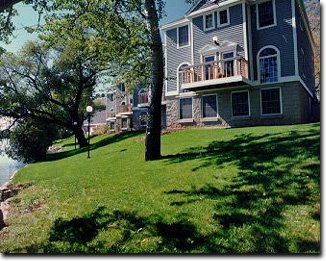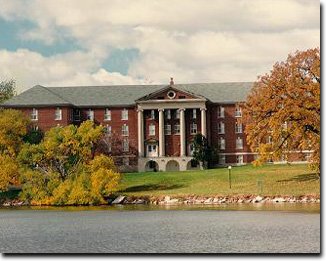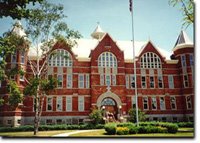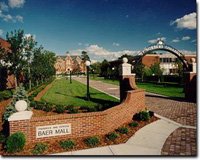|
The admissions information below is valid for the 2006-07 academic year.
|

|
| Admissions officer: |
Bridget K. O'Connor,
Dean of Admission and Enrollment Management |
| Contacting the office: |
800 236-4878
800 236-4878 (toll free)
920 403-4072 (fax)
admit@snc.edu |
|
| Is there an application deadline for fall? |
no |
| Priority filing date for fall: |
April 1 |
| Freshmen are accepted for terms other than fall: |
yes |
| Percent of freshmen who enter in terms other than fall: |
1% |
| Application fee: |
$25 |
| Can the application fee be waived? |
yes |
| Are refunds available on the application fee? |
no |
| Is the Common Application form accepted? |
yes |
| Supplemental forms required for those using Common Application: |
no |
| Admissions requirements: |

|
Minimum combined SAT I score of 900 (composite ACT score of 19), rank in top half of secondary school class, and minimum 2.5 GPA recommended. |
|
| High school graduation is: |
required, GED is accepted |
| A general college preparatory program is: |
recommended |
| Campus visit is: |
recommended |
| Interview is: |
recommended |
| Off-campus interview: |
can be arranged with admissions representative |
| Standardized test requirements: |
SAT I considered if submitted, ACT considered if submitted, SAT I or ACT required, SAT II recommended |
| School's test preference: |
no preference |
| Dates test scores should be received: |
May 1 for SAT I/ACT, May 1 for SAT II |
| High school units required or recommended: |
| English: |
4 recommended |
| Foreign language: |
2 recommended |
| History: |
2 recommended |
| Lab: |
3 recommended |
| Math: |
3 recommended |
| Science: |
3 recommended |
| Social studies: |
2 recommended |
| Total: |
16 recommended |
|
| Special programs/policies for applicants not normally admissible: |
Success Program, Academic Enhancement Program |
| School has formalized early decision program: |
yes |
| Early decision application deadline: |
December 1 |
| Number of early decision applications submitted: |
28 |
| Number of early decision applications accepted: |
28 (100%) |
| School has early action program: |
no |
| School has concurrent enrollment program for high school: |
yes |
|
| Academic criteria: |

|
- secondary school report very important
- class rank considered
- recommendations considered
- standardized test scores important
- essay considered
|
|
| Nonacademic criteria: |

|
- interview considered
- extracurricular activities considered
- particular talent/ability considered
- character/personal qualities considered
- alumni/ae relationship considered
- geographical residence not considered
- state residency not considered
- religious affiliation/commitment not considered
- minority affiliation not considered
- volunteer work considered
- work experience considered
|
|
| Admissions is need blind: |
yes |
| Average secondary school GPA: |
3.3 |
| Percent of freshmen who submitted GPA: |
98% |
| Percent of student body in each high school class rank: |
Top tenth: 29%
Top quarter: 56%
Top half: 85%
Bottom half: 15% |
| Percent of freshmen who submitted class rank: |
76% |
| Average ACT: |
24 composite |
| Combined ACT middle 50% range: |
22 - 26 |
| Test taken by majority of applicants: |
ACT |
| Percent of accepted applicants who submitted ACT score: |
96% |
|
| Notification of admission: |
on a rolling basis |
|
| Number of completed applications received: |
1,725 |
| Number of applicants offered admission: |
1,513 (88%) |
| Number of applicants offered admission who enrolled: |
552 (36%) |
| School has a waiting list policy: |
no |
| Percent of freshmen who came from public schools: |
80% |
| Percent of freshmen who came from out of state: |
34% |
| Tuition deposit amount: |
$250, nonrefundable |
| Room deposit amount: |
$100, refundable ? |
| Admission may be deferred: |
yes, up to 1 year |
|
|
| Semester/term begin dates: |
in early September and mid-January. |
| Calendar system: |
semester system (two terms comprise academic year) |
| Month(s) in which new student orientation is held: |
Orientation for new students held in June and August. |
| Number and length of summer sessions: |
Two summer sessions, one of three weeks and one of five weeks. |
|
| Majors with the highest enrollment: |
business administration, elementary education, communication/media/theatre |
| Percent of full-time freshman students who returned for sophomore year: |
80% |
| Student:Faculty ratio: |
14:1 |
| Total faculty: |
109 men, 68 women, 177 total |
| Full-time faculty: |
70 men, 39 women, 109 total |
| Part-time faculty: |
35 men, 35 women, 70 total |
| Graduation rate: |
72% within six years |
|

|
| General education/core curriculum is required: |
yes |
| Minor requirements: |
required of some for graduation |
| Physical education is required: |
no |
| There are religious requirements for graduation: |
yes |
|
| Special programs offered: |

|
student-designed majors, double majors, independent study, honors program, internships |
|
| Minors and other miscellaneous programs offered: |

|
Minors offered in most majors and in American studies, classical studies, Japanese, leadership studies, peace and justice, Philippine studies, and women and gender studies. |
|
| Education certifications: |

|
early childhood, elementary, middle/junior high, secondary, bilingual/bicultural |
|
| Graduate schools/programs are offered: |
yes |
| Qualified undergraduates may take graduate-level classes: |
no |
| Domestic off-campus semester-away programs: |
Washington Semester (American University) |
| Study abroad opportunities: |

|
Australia, Austria, Botswana, Cameroon, Chile, Ecuador, Egypt, France, Germany, Ghana, Hungary, Ireland, Israel, Italy, Japan, Kenya, Madagascar, Mali, Mexico, Morocco, Netherlands, New Zealand, Philippines, Senegal, Spain, Switzerland, Tanzania, Turks and Caicos Islands, Uganda, United Kingdom |
|
| Other special or unique academic programs: |

|
Foundation for International Education (London)Internship |
|
| Army ROTC: |
offered on-campus |
| Navy ROTC: |
not offered |
| Air Force ROTC: |
not offered |
|

|
Bachelor's Degrees
- Accounting
- Art
- Biology
- Business Administration
- Chemistry
- Commercial/Advertising Art
- Communication/Media/Theatre
- Computer Science
- Economics
- Elementary Education
- English
- Environmental Science
- French
- German
- Health Care Administration
- History
- Humanities/Fine Arts
- International Business/Language Area Studies
- International Studies
- Mathematics
- Music Education
- Natural Sciences
- Nursing
- Paralegal
- Philosophy
- Physics
- Political Science
- Psychology
- Religious Studies
- Renewable Resources
- Sociology
|
|
|
| Credit placement options: |

|
- placement for CEEB Advanced Placement (scores of 3 or higher)
- credit and/or placement for CLEP general
- credit and/or placement for CLEP subject
- placement for DANTES
- credit for relevant military experience
- credit and/or placement for international baccalaureate
|
|
|
|
The financial aid information below is valid for the 2007 academic year.
|
| Financial aid officer: |
Jeff Zahn,
Director of Financial Aid |
| Contacting the office: |
920 403-3071
888 786-6721 (toll free)
920 403-4086 (fax)
finaid@mail.snc.edu |
| FAFSA number: |
003892 |
|
| Undergraduate tuition: |
$24,253; $24,253 out-of-state |
| Tuition notes: |
in-state tuition based on per credit hour |
| Additional required fees: |
$400 |
| Book fees: |
$500 |
| Miscellaneous expenses: |
$1,100 |
| Combined room and board expenses: |
$6,579 - $6,579 |
|
| Required form |
Priority date |
Rolling? |
Closing date |
| FAFSA | March 1 | no | N/A |
|
| Date award notification begins: |
March 15 |
| Applied for financial aid: |

|

|
| 84% | of first-year students |
| 78% | of full-time undergraduates |
| 95% | of part-time undergraduates |
|
| Determined to have financial need: |

|

|
| 78% | of first-year students |
| 82% | of full-time undergraduates |
| 84% | of part-time undergraduates |
|
| Students determined to have financial need who received any financial aid: |

|

|
| 100% | of first-year students |
| 100% | of full-time undergraduates |
| 100% | of part-time undergraduates |
|
| Students determined to have financial need who received any need-based gift aid: |

|

|
| 97% | of first-year students |
| 97% | of full-time undergraduates |
| 81% | of part-time undergraduates |
|
| Students receiving financial aid who received need-based self-help aid: |

|

|
| 77% | of first-year students |
| 81% | of full-time undergraduates |
| 94% | of part-time undergraduates |
|
| Students receiving financial aid who received any non-need-based gift aid: |

|

|
| 4% | of first-year students |
| 3% | of full-time undergraduates |
| 0% | of part-time undergraduates |
|
| Students receiving financial aid whose need was fully met (excluding PLUS loans and private alternative loans): |

|

|
| 38% | of first-year students |
| 43% | of full-time undergraduates |
| 12% | of part-time undergraduates |
|
| Average percent of need that was met of students who received any need-based aid (excluding PLUS loans and private alternative loans): |

|

|
| 92% | for first-year students |
| 90% | for full-time undergraduates |
| 72% | for part-time undergraduates |
|
| Average financial aid package (excluding PLUS loans and private alternative loans): |

|

|
| $17,598 | for first-year students |
| $17,303 | for full-time undergraduates |
| $8,624 | for part-time undergraduates |
|
| Average need-based gift award: |

|

|
| $13,541 | for first-year students |
| $12,337 | for full-time undergraduates |
| $4,824 | for part-time undergraduates |
|
| Average need-based self-help award (excluding PLUS loans and private alternative loans): |

|

|
| $4,130 | for first-year students |
| $5,273 | for full-time undergraduates |
| $4,084 | for part-time undergraduates |
|
| Average need-based loan (excluding PLUS loans and private alternative loans): |

|

|
| $3,420 | for first-year students |
| $4,723 | for full-time undergraduates |
| $3,893 | for part-time undergraduates |
|
| Students who had no financial aid need and who received non-need-based aid (excluding athletic awards and tuition benefits): |

|

|
| 29% | of first-year students |
| 31% | of full-time undergraduates |
| 10% | of part-time undergraduates |
|
| Average award to students who had no financial aid need and who received non-need-based aid (excluding athletic awards and tuition benefits): |

|

|
| $7,520 | for first-year students |
| $7,341 | for full-time undergraduates |
| $2,750 | for part-time undergraduates |
|
| Students who received a non-need-based athletic award: |

|

|
| 0% | of first-year students |
| 0% | of full-time undergraduates |
| 0% | of part-time undergraduates |
|
| Average non-need-based athletic award: |

|

|
| $0 | for first-year students |
| $0 | for full-time undergraduates |
| $0 | for part-time undergraduates |
|
| School participates in Federal Work-Study Program: |
yes |
| Percent of students who received aid that participated in Federal Work Study: |
19% |
|
| Types of loans available: |

|
- Direct Subsidized Stafford Loans
- Direct Unsubsidized Stafford Loans
- Direct PLUS Loans
- Federal Perkins Loans
- College/University Loans
|
|
| Parent loans packaged to meet need: |
yes |
| Percent of undergraduates who have borrowed through all loan programs: |
65% |
| Average student debt upon graduation: |
$24,808 |
| Types of payment plans: |

|
- Key Education Resources (formerly Knight Tuition Plans)
- deferred payment plan
- school's own payment plan(s)
|
|
| Need-based scholarships/grants available: |

|
- need-based (general)
- Federal Pell Grants
- SEOG
- state scholarships/grants
- college/university scholarships/grants (institutional funds)
- private scholarships/grants
|
|
| Non-need-based scholarships/grants available: |

|
- non-need-based (general)
- state scholarships/grants
- academic merit scholarships/grants
- creative arts/performance
- special characteristics
- ROTC scholarships
|
|
| Percent of scholarship aid awarded to out-of-state students: |
0% |
|
|
| Total undergraduates: |
882 men, 1,133 women, 2,015 total |
| Full-time undergraduates: |
851 men, 1,107 women, 1,958 total |
| Part-time undergraduates: |
31 men, 26 women, 57 total |
| Total graduate students: |
23 men, 34 women, 57 total |
| Part-time graduate students: |
23 men, 34 women, 57 total |
| Average age of full-time undergraduates: |
20 |
| U.S. region where majority of students come from: |
Midwest |
| Percent of full-time U.S. undergraduates from out of state: |
28% |
| First-year student breakdown: |

|

|
| 1.1% | Black (non-Hispanic) |
| 0.9% | American Indian or Alaskan Native |
| 2.4% | Asian or Pacific Islander |
| 2.4% | Hispanic |
| 90.9% | White (non-Hispanic) |
| 0.7% | total international (nonresident aliens) |
| 1.6% | race/ethnicity unreported/unknown |
|
| Undergraduate breakdown: |

|

|
| 0.8% | Black (non-Hispanic) |
| 1.0% | American Indian or Alaskan Native |
| 1.8% | Asian or Pacific Islander |
| 1.6% | Hispanic |
| 92.1% | White (non-Hispanic) |
| 1.7% | total international (nonresident aliens) |
| 1.0% | race/ethnicity unreported/unknown |
|
|
|
|
| Campus size: |
93 acres |
| City or town school is located in: |
De Pere |
| Population of city/town: |
22,679 |
| Locations of branch/satellite campuses: |
Graduate courses in Theological Studies are offered at Albuquerque, NM. |
| Nearest major city: |
Green Bay |
| Distance of nearest major city: |
5 miles |
| Population of nearest major city: |
102,726 |
| Online campus map: |
www.snc.edu/tour/ |
|
| Institution offers housing: |
yes |
| Campus housing available to all unmarried students regardless of year: |
yes |
| Housing types (% in housing type, if given): |

|
- coed dorms (65%)
- women's dorms (11%)
- sorority housing
- fraternity housing
- single-student apartments (7%)
- special housing for disabled students (1%)
- other housing including Townhouses, College Owned Houses, Living/learning residence hall experience for freshmen seminar (16%)
|
|
| Percent of freshmen who live in school housing: |
90% |
| Percent of students who live in school housing: |
74% |
| Percent of students who live off campus: |
26% |
| Students required to live on campus: |
All unmarried students under age 22 must live on campus unless living with family near campus. |
| Percent of all students who have cars on campus: |
54% |
| Student conduct policies: |

|
class attendance policies set by individual instructors, honor code, hazing prohibited |
|
| Alcohol is permitted on campus to students of legal age: |
yes |
|
| Every student is required to lease or own a computer: |
no |
| Every student is required to take a computer course: |
no |
| Computer equipment is provided in: |
residence halls, library, computer center/lab(s) |
| Total number of microcomputers available to students: |
221 |
| Internet access provided to all students: |
yes |
| E-mail services/accounts provided to all students: |
yes |
| School has a library on campus: |
yes |
| Additional library facilities/collections: |

|
The St. Norbert College library provides access to a vast amount of periodical literature in all available media and formats. In addition to the 700 journal subscriptions held locally, the library subscribes to a number of online database indexing and abstracting services. These databases provide citations/abstracts for approximately 35,000 journals and full text articles for 9000 of these journals. The library also has a curriculum and children's and young adult literature collection as well |
|
| Museums and other special academic buildings/equipment on campus: |

|
Riverfront campus center, on-campus hotel and conference center, fine arts and performing arts centers, art galleries, center for international education, peace and justice center, center for leadership and service, center for adaptive education and assistive technology, children's center associated with early childhood education program, women's center, men's center, spaces reserved for prayer and reflection in many campus buildings, survey center, center for Norbertine studies. |
|
|
| Remedial learning services: |

|
reading, writing, math, study skills |
|
| Additional services offered: |

|
nonremedial tutoring, placement service, health service, women's center, day care, health insurance |
|
| Counseling services: |

|
minority student, military, veteran student, older student, birth control, career, personal, academic, psychological, religious |
|
| Career placement services: |

|
internships, interest inventory, on-campus job interviews, resumé assistance, alumni services, interview training |
|
| Services for students with disabilities: |

|
note-taking services, tape recorders, tutors, reader services, special housing, adaptive equipment |
|
| Amount of campus that is accessible to physically handicapped: |
68% |
|
| Number of social fraternities on campus: |
3 |
| Number of fraternities that have chapter houses: |
1 |
| Percent of men who join fraternities: |
7% |
| Number of social sororities on campus: |
5 |
| Number of sororities that have chapter houses: |
1 |
| Percent of women who join sororities: |
7% |
| Student activities: |

|
student government, student newspaper, literary magazine, radio station, television station |
|
| School newspaper(s): |
SNC Times, Graphos |
| Total number of registered organizations: |
68 |
| Campus-based religious organizations: |

|
Campus Ministries, Athletes for Life, Campus Crusade for Christ, Circle K |
|
| Minority student organizations: |

|
Discoveries International, Rainbow Alliance, Beyond Borders, Japan Club, Viva Espanol |
|
| Other student organizations, musical groups, activities, and committees: |

|
Aikido Club, Society of Human Resource Management, Society of Physics Students, Student Alumni Association, Student Education Association, Student Government Association, Student in Free Enterprise, WSNC Radio, Your Entertainment Service, Colleges against Cancer, Lions Club, Chemistry Club, Pen and Ink Club, Environmental Club, Film Club, Rugby Club, Ski and Snowboarding Club, Zen Club, Computer Science Club, College Democrats, College Republicans, Habitat for Humanity, Knight Theatre, MENC, Pre-Health Science Club, Residence Hall Association |
|
|
| School has an athletic program: |
yes |
| Athletic director: |
Tim Bald,
Director of Athletics |
| Director of women's athletics: |
Connie Tilley |
| School colors: |
green and gold |
| School mascot: |
Green Knight |
| Athletic conference memberships: |
;Midwest Conference (Division III);Northern Collegiate Hockey Association (Division III) |
| Sports offered |
Scholarships? |
Athletic Assoc. |
| Men's baseball | no | NCAA Div. III |
| Men's basketball | no | NCAA Div. III |
| Men's cross-country | no | NCAA Div. III |
| Men's football | no | NCAA Div. III |
| Men's golf | no | NCAA Div. III |
| Men's ice hockey | no | NCAA Div. III |
| Men's soccer | no | NCAA Div. III |
| Men's tennis | no | NCAA Div. III |
| Men's track and field (indoor) | no | NCAA Div. III |
| Men's track and field (outdoor) | no | NCAA Div. III |
| Women's basketball | no | NCAA Div. III |
| Women's cheerleading | no | |
| Women's cross-country | no | NCAA Div. III |
| Women's golf | no | |
| Women's soccer | no | NCAA Div. III |
| Women's softball | no | NCAA Div. III |
| Women's swimming | no | NCAA Div. III |
| Women's swimming | no | |
| Women's tennis | no | NCAA Div. III |
| Women's track and field (indoor) | no | NCAA Div. III |
| Women's track and field (outdoor) | no | NCAA Div. III |
| Women's volleyball | no | NCAA Div. III |
|
| Percent of students in varsity/club intercollegiate sports: |
10% |
| Percent of students in intramural/recreational sports: |
10% |
| Athletic facilities: |

|
baseball, softball complex; basketball, volleyball center; football, golf course, park, soccer stadium, and swimming pool
|
|
| Intramural/Recreational sports: |

|
basketball, flag football, volleyball
|
|
| Club sports for men: |

|
crew, rugby
|
|
| Club sports for women: |

|
crew, rugby
|
|
|
| Public transportation serves campus: |
yes |
| Nearest international airport: |
Green Bay (7 miles) |
| Nearest other airport: |
Appleton, WI (25 miles) |
| Nearest passenger train service: |
Milwaukee, WI (120 miles) |
| Nearest passenger bus service: |
Green Bay (6 miles) |
|
| Institutional employment is available: |
yes |
| Percent of full-time undergraduates working on campus: |
37% |
| Off-campus employment opportunities for undergraduates are: |
fair |
| Freshmen are discouraged from working for first term: |
no |
|
| Percent of graduates who pursue further study: |
16% immediately |
| List of graduate schools most often selected by recent graduates: |

|
Culinary Institute of America (NY);DePaul University (IL);Florida State University (FL);Hamline University (MN);Iowa State University (IA);John Marshall Law School (IL);Loyola University Chicago (IL);Marquette University (WI);Miami University--Oxford (OH);Michigan State University (MI);Northern Illinois University (IL);Pennsylvania State University--University Park (PA);Southern Illinois University--Springfield (IL);St. Louis University (MO);St. Xavier University (IL);University of Chicago (IL);University of Iowa (IA);University of Michigan--Ann Arbor (MI);University of Minnesota--Twin Cities (MN);University of Notre Dame (IN);University of San Diego (CA);University of Tennessee (TN);University of Vermont (VT);University of Washington (WA);University of Wisconsin--Green Bay (WI);University of Wisconsin--Madison (WI);University of Wisconsin--Milwaukee (WI);University of Wisconsin--Oshkosh (WI);Valparaiso University (IN) |
|
| Percent of graduates who enter job market in field related to major: |
74% within one year of graduation |
| List of firms that most frequently hire graduates: |

|
Associated Bank, M & I Bank, Americorps, Green Bay Public Schools, Schneider Logistics, Schneider National, Schreiber Foods, Wells Fargo, Green Bay Area Private Schools, Humana, Acuity Insurance |
|
| List of most prominent alumni/ae: |

|
- Honorary Mary Mullarkey, Chief Justice of the Colorado Supreme Court Donald J. Schneider, Chairman of the Board, Schneider National, Inc.
|
|
|




